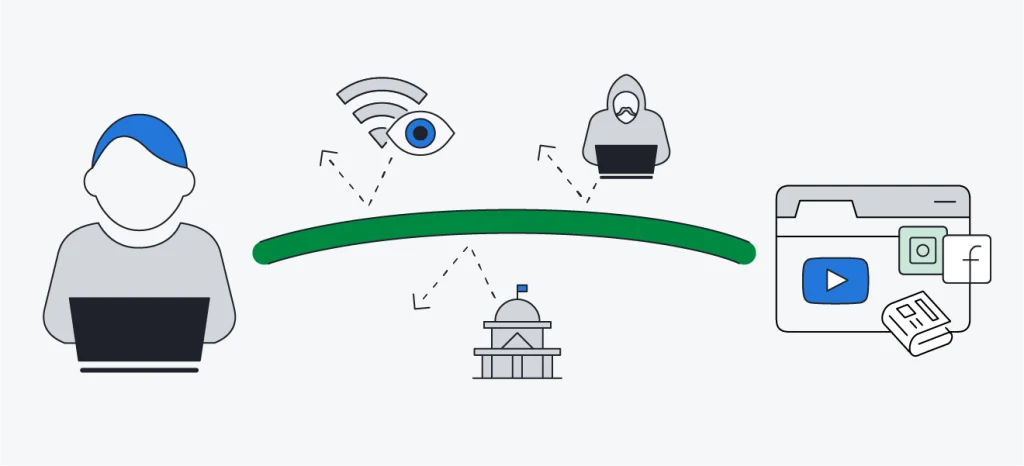The internet is a treasure trove of information, but that doesn’t mean some aspects aren’t blocked to you.
Your geolocation plays a significant role in the type of information you can view, sometimes to your detriment.
Various ways to bypass these restrictions exist, like using a US proxy which you can check out here. However, before we get into how to avoid it, let’s look at why it happens.

Geolocation and Blocking
Your geolocation is the physical location that your IP address records. Businesses use geolocation to tailor their websites better and offer for your specific area. It’s why stores and offers near you will pop up when you search for something on a browser in another location.
This personalization helps boost the website’s SEO and makes it more relevant to clients in that market.
However, it can also mean it restricts you from accessing particular information in other areas. You might find that you can’t access a specific website or have content restrictions as part of censorship regulations. Further, you only receive news from your location, not other countries.
Geoblocking means that you can’t always get access to the games, information, prices, or products you want. The prices can also change depending on your location, so you might be paying more for something than it would be elsewhere. You could also struggle to stream movies and shows due to license restrictions.
The extent of geo-blocking vastly differs depending on the country. Some countries have legalized geoblocking social media sites. Others, like the EU, have banned unjustified geoblocking as a discriminatory practice.
As such, a large part of geoblocking is due to licensing and regulation, copyright, and other red tape jurisdictional issues. Various sites like YouTube, Spotify, and Airbnb also allow creators to block specific jurisdictions on the apps.
How to Access Geo-Blocked Information
Luckily, there are various ways to access geo-blocked information. Below, we look at some of the best ways to open the internet and have unrestricted access to information and services.
Tor Browser
Tor browser is a more anonymous browser, and one of the few truly private ones, that helps you access sites without giving all of your information. It has unique “.onion” websites, which hide your IP address and give you an encrypted and anonymous connection. However, this browser can also load slowly, and you don’t have a choice on the server you use.
Further, since it’s easy to connect to the dark web using it, it’s also more prone to having parts of the network compromised. As such, while anonymously browsing the internet is excellent, it’s not the best for accessing country-specific information.
VPN
A VPN is a Virtual Private Network that runs your requests through an encrypted private tunnel. Like proxies, it hides your IP address, and unlike the Tor browser, you can set the location to specific geolocations when browsing. However, good VPNs which are trustworthy are expensive.
Further, you often require admin access to install it on your device, which might be problematic if you need it for work-related purposes. As such, it’s not always the easiest way to change your device’s location, and free VPNs aren’t worthwhile.
Smart DNS and DNS Changers
DNS (Domain Name System) is the part of a web address that helps websites become readable to your device. You can type in the website name instead of the sequence of numbers that identifies it in the background.
The DNS of a connection contains a location identifier, which means changing your DNS can make it look like a different location. DNS changers or resolvers can change your device location to one in another country. However, it’ll only help you bypass basic blocks and doesn’t encrypt any of your data.
Residential Proxies
Residential proxies are reliable middleman servers that help reroute your requests. You can set the location of the US proxy to any place in the US or even areas in other countries. The IP addresses it uses are all linked to home devices, meaning it’s the ones ISPs generate.
As it’s actual IP addresses from residential devices, it’s safer and more reliable, less likely to become blocked. Since it looks like a natural connection, you can more easily gain the information you want, all while protecting your data and geolocation.
Access All the Information You Want
Geo-blocking is a common occurrence and is present in many different website types. However, it can become annoying if you’re doing market research for another location or trying to get the latest game. While we understand the restrictions are often due to licensing, it’s not always non-discriminate geoblocking.
Luckily, various ways exist to help hide your IP address and location and access content in another market. Each method has pros and cons, but residential proxies, like a US proxy, help you navigate and change to another location easily.
